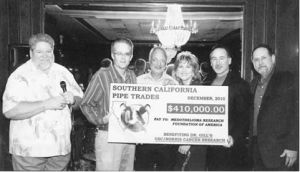Summary:
A new drug, Veglin, is a mesothelioma treatment that acts as like an anti-angiogenesis agent that works by cutting off the blood supply that cancer cells require in order to grow. The cancer cells are starved with no adverse effects to normal healthy cells. Clinical Trials of Veglin for Phase I and II have been successful at stopping mesothelioma cancer. National clinical trials of this drug for Phase III study by FDA approval are ready to launch in 2011.
Mesothelioma Research Foundation of America
Westlake Village, California
March 24, 2011
Veglin is set for Phase III of the FDA approval process but we are currently being held back by the funding needed. Good news is we are at the beginning of our fundraising season and hope to generate the funds needed over the next couple of months with clay shoots and golf tournaments taking place between may and July of 2011.
The benefit of introducing Veglin into Phase III is we will be able to provide Veglin to any facility of hospital willing to administer it to mesothelioma patients. This will broaden our patient base and speed the FDA approval process in making Veglin a “mainstream” treatment for mesothelioma. As of today we are very localized, administering the drug only in Southern California at the USC Norris Comprehensive Center, but we hope to have this changed very soon.
It is amazing how far we have come in the last 9 years, operating on a budget that is a fraction of what most pharmaceutical companies will put into the development of new drugs. This is all thanks to our friends in the Insulators Unions, D.C. 16 and Building Trades Councils who are always there lending support.
About Veglin
Veglin is an anti-angiogenesis non-chemotherapy drug (angiogenesis inhibitor) that was developed by Dr. Parkash Gill’s for the treatment of a variety of malignancies including mesothelioma. Veglin is one of several newly developed non-chemotherapy drugs being tested for possible utilization in the ongoing struggle to combat malignant mesothelioma.
Veglin is an antisense oligonucleotide that binds with DNA genes that are responsible for the production of proteins called Vascular Endothelial Growth Factors (VEGF), with the intention of inhibiting their production. This new drug acts as like an anti-angiogenesis agent that works by cutting off the blood supply that cancer cells require in order to grow. The cancer cells are starved with no adverse effects to normal healthy cells.
Veglin proved successful in FDA monitored Phase I and Phase II clinical trials. Many patients suffering and dying from mesothelioma cancer are very hopeful for the possibilities of a more effective cancer treatment compared to what presently is available for mesothelioma victims.
About Mesothelioma Research Foundation of America
The Mesothelioma Research Foundation of America has a mission: fund research that will lead to the quickest cure for mesothelioma. Mesothelioma is a cancer of the lining of the lungs caused by asbestos exposure. This cancer disease had few treatment options until this Foundation and Dr. Parkash Gill’s work created better treatment options. Today, the future looks more hopeful for additional improved treatment options available to those stricken by this cancer.
The Foundation began funding research for a cure in 2001 with the opening of the Mesothelioma Laboratory at USC Norris Comprehensive Cancer Medical Center in Los Angeles under the supervision of Dr. Parkash Gill.
Dr. Gill is a board certified oncologist and hematologist who has received FDA approval from the U.S. Government to do Clinical Trials on a mesothelioma treatment drug called Veglin. We believe there is great promise and hope in Veglin and the Mesothelioma Research Foundation of America has funded 100% of Dr. Gill’s research. Every dollar donated to the Foundation goes to the Phase III Clinical Trials of Veglin, a mesothelioma treatment.
Contact Information:
Shane Rucker
Mesothelioma Research Foundation of America
Toll Free:
(800) 909-Meso (6376)
Links:
Get their website information at:
http://mesorfa.org
Their blog is at:
http://mesorfa.info
Find them on FaceBook at:
http://facebook.mesorfa.org

